Being Jewish
Feature
Living on the Edge of Food Insecurity
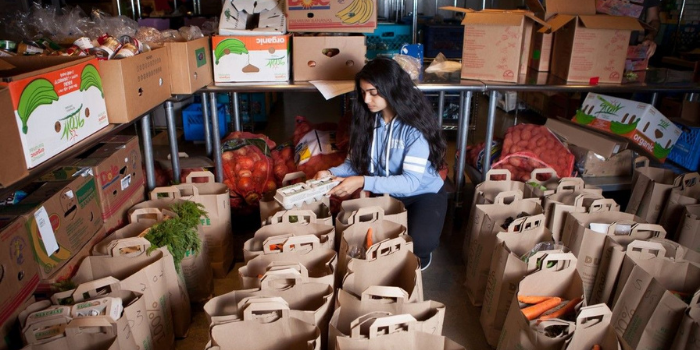
Steve drove a bus for New York City’s Metropolitan Transportation Authority for 20 years until a work-related injury forced him onto disability insurance in 2013. His life crumbled. He didn’t have enough money for rent or groceries, and he and his fiancé broke up. He moved to Florida, but the fresh start he’d hoped for never materialized.
“Between $1,000 in rent a month and other bills, there was little left. I was barely making it. In fact, I wasn’t making it,” said the unmarried, Jewish 63-year-old, who asked that his last name not be used.
Eventually, Steve, who scrapes by on odd jobs along with government assistance, heard about WECARE Food Pantry, located on the campus of the Soref Jewish Community Center in Plantation, Fla., near his Deerfield Beach home. Like many other Jewish-run food charities, the pantry is supported through a mix of private donations, federation funds and local food drives.
“It helps me make it through the month. I get the basics. Non-perishables. I’m eating hamburger, not filet mignon,” he said of the prepackaged food bags he picks up curbside each month.
Susan Baigelman, WECARE’s director for nearly two decades, said she’s seen all sorts of people walk through the pantry’s doors: senior citizens on fixed incomes, survivors of natural disasters, single mothers, working families and people like Steve.
“The number one thing I notice is that people don’t want to be here,” Baigelman said, chatting on the phone while driving to pick up kosher food for the pantry. “Sometimes, like after [Hurricane] Wilma, there are people who say, ‘I used to be a donor. I never thought I’d be needing this.’ The people look like you and me. The face of hunger is everybody.”
In the United States, 40 million people face food insecurity, according to the United States Department of Agriculture. Of those, 12.9 million are children. Although initial reports indicated that the number of food insecure doubled to 80 million during the pandemic, more recent data from the USDA showed that federal Covid relief funding averted a more severe hunger crisis, according to Abby Leibman, president and CEO of MAZON: A Jewish Response to Hunger.
Even if the numbers were lower than expected, Leibman said, “the fact that more than 10 percent of this country still faces food insecurity is a national disgrace, and it underscores the urgent need for legislative action on lasting policy solutions.”
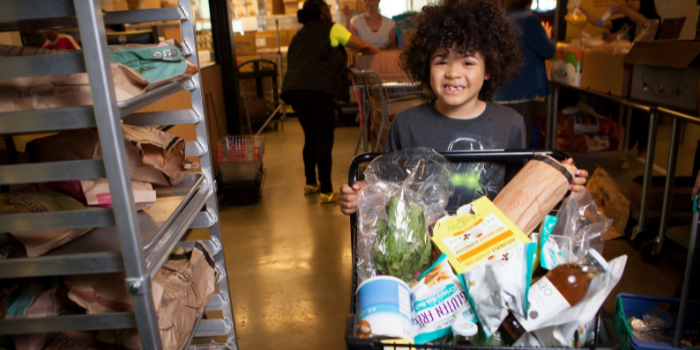
Although there are no precise numbers on how many Jewish-run organizations help the food insecure or how many Jewish people rely on either government assistance or charity, Jewish groups are involved on all levels. That includes organizations like the Los Angeles-based MAZON, which pushes for policy changes on the federal level, and scores of charitable organizations, some more well-known than others, like Jewish Family Services, that run food banks and soup kitchens on the local level. These programs, which provide kosher food, and in some cases non-kosher food as well, serve everyone in need, regardless of race, religion or ethnicity.
“The issue of hunger in America is a matter of political will. We have the capacity to feed people,” Leibman said. “Ending hunger in America isn’t a supply issue and ending hunger doesn’t mean no one goes hungry. What it means is more people moving off government assistance.”
Until that can be achieved, she added, federal subsidy programs are needed to reduce food insecurity. One step toward that goal was the recent 25 percent expansion of SNAP, the Supplemental Nutrition Assistance Program previously known as the Food Stamp Program. The increase, which took effect in October, translates to just over $36 a month per person. In addition to SNAP, the National School Lunch Program and the Special Supplemental Nutrition Program for Women, Infants, and Children, known as WIC, help address food deficits. According to the USDA, 58 percent of food-insecure households participated in one of these three programs in the past two years.
In addition to advocating for the expansion of federal food assistance programs, MAZON pushes for policies that address the underlying causes of food insecurity and poverty, including systemic issues like low wages that contribute to hunger among military families and households headed by single mothers. Even with added assistance, people will still go hungry because of unexpected crises like job losses, steep medical bills or natural disasters, Leibman said. Charities help address the need, but because they rely on volunteers and donations—both monetary and food items—they will never be able to feed every hungry person in their community.

When Jewish Family Service in Salt Lake City opened its pantry in 2008, with “six of the wobbliest shelves built by Eagle Scouts,” recalled Ellen Silver, the pantry director, it began serving 85 households every month. That figure has grown to 3,000 a month, an uptick Silver attributes to the impact of the 2008 financial crisis on individual retirement funds and, more recently, high unemployment during the Covid pandemic.
“I have found that an extraordinary number of people live on the edge,” said Silver, who works with a team of volunteers. “There will be one little extra expense, maybe a tire repair or a health issue, and suddenly there isn’t enough money to feed your family.”
While Jewish food programs serve all demographics, older Americans are increasingly in need of their services. According to the Pew Research Center, the number of people aged 60 and over experiencing food insecurity has increased more than 30 percent since 2008.
On the West Coast, in a rapidly gentrifying neighborhood in Seattle, the Jewish Family Service’s Polack Food Bank distributes bags filled with groceries to some 800 households and makes deliveries to nearly 400 other households each month. The sole kosher food bank in Washington State, it primarily serves Jewish senior citizens from Eastern Europe and immigrants from China.
“Of those we serve, only a minute portion are homeless; 97 percent are housed and working,” said Brian Sindel, the food bank’s manager.
One longtime client, Eliora Jablow, suffers from a seizure disorder. The 60-year-old former social worker relies on an annual income of $11,000 from government benefits, including disability insurance and social security. She estimates that she has between $8,000 and $9,000 in annual medical expenses.
“It doesn’t leave me very much for food, telephone, internet and electricity,” she said. “If it weren’t for the food bank, I’d starve.”
Because the food bank partners with local farms who donate crops, clients like Jablow can complement their meals with fresh produce. She recently got fresh cherries, which she ate for dessert, put on oatmeal for breakfast and dried to use later for tea.
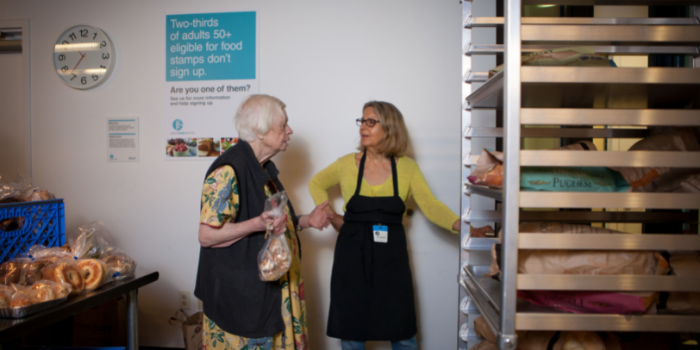
“We learn to cook with what we have instead of what we might choose in a grocery store,” Jablow said. “I’ve learned to dehydrate, freeze and can fresh produce. I’ll make soups and stews out of it so I will have it when it’s not available.”
It wasn’t easy admitting she needed help. Raised in a middle-class household outside of Chicago, her family members were social activists. “I was always someone who gave, not who got. When I was working, I was always thinking of ways to advocate for my clients,” said Jablow, who is active in her local synagogue. “When I became disabled, I had to ask for help for myself and that was hard. I was embarrassed at first, but the food bank never made me feel ashamed or that I was asking for too much.”
Alfred, who declined to share his last name, lives in Washington Heights on the northern tip of Manhattan. He is one of 1.1 million New York State residents who are food insecure, according to the USDA. Each week, he drives to the Council House on the Upper West Side of Manhattan, where the National Council of Jewish Women’s New York section operates a food pantry and hot-meal program.
“I come here for help because my family needs it. The situation is very dire. There are five of us and I have no job. Who is going to hire me? I’m 75. I make do with what I get,” he said, tugging down his blue baseball cap as the thunder rumbled and the rain came down. While the pantry officially opens at 9:30 a.m., Alfred had arrived at 7 a.m. sharp. He wanted to be first in line when volunteers began handing out prepackaged bags from just inside the entrance.
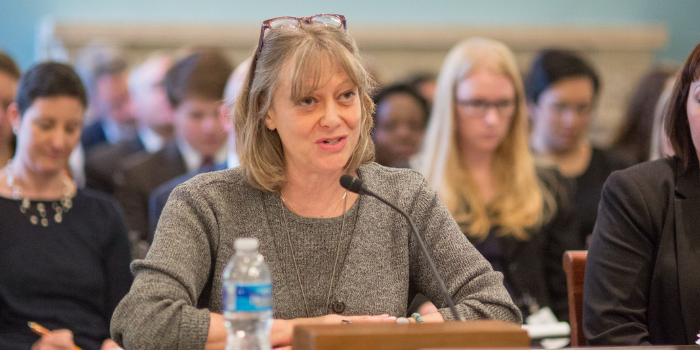
Before Covid, he went inside the Council House building and “tabletop shopped,” choosing his own food. Now a dozen masked and gloved volunteers move in companionable silence, packing bags and bringing up dairy products from the basement’s newly installed walk-in cooler.
Three bags finally in hand, Alfred loaded them into the trunk of his blue car. One held dry goods like oats and beans. Fruits and greens filled a second bag, and the third bulged with milk, cottage cheese and sour cream.
Before Covid, Council House served between 100 and 200 households weekly. It now serves between 300 and 350 households, said Andrea Kopel, executive director of NCJW’s New York section.
“I see the FedEx guy here picking up food and the busboys from the restaurant next door,” said Kopel. “Those folks should be making a true living wage. They shouldn’t need emergency food assistance. The pandemic has shown us just how close to the edge many New Yorkers live.”
Other New Yorkers find help at Masbia, which Alexander Rapaport founded in 2005. With locations in Flatbush and Borough Park, Brooklyn, and Forest Hills, Queens, Rapoport runs two programs in each place. The kosher soup kitchen serves people ready-to-eat dinners in a restaurant-style setting. At the kosher food pantry, volunteers wearing bright green aprons distribute raw food packages for people to bring home. According to Masbia, since March 2020, their facilities have served more than 250,000 to-go meals.
During the peak of the pandemic, people stood on long, socially distanced lines, Rapaport said. Now those with smartphones can schedule appointments via an app. Masbia helps mostly senior citizens, immigrant families and Orthodox Jews.
“We are about unconditional sharing,” Rapaport said. “When someone has no one else to turn to, they turn to us. We give a little hot soup, a decent lunch or dinner. It might be a small thing, but it is so important.”
Meanwhile, on a summer day in New Haven, Conn., Sandy Hagan, the director at Jewish Family Service of Greater New Haven Food Pantry, glanced at her planner and declared, “It’s ‘Russian Day,’ ” noting that local Russian immigrants would be visiting the pantry that day.
Together with two volunteers, she will check that each bag includes fresh cabbage, potatoes, frozen chicken and apples. “We try and tailor the food to what people will want to cook,” Hagan said, noting that their Russian patrons “really like cabbage and apples.”
Tucked behind a diner, the pantry, which serves about 250 people monthly, resembles a small corner store. Cans of pumpkin puree and coconut milk line the shelves along with tins of tuna and canned fruit. There are also low-sodium, gluten-free and kosher options.
In addition to the Russians who immigrated to the area after the Soviet Union collapsed, the pantry’s clientele includes military families, single mothers and Holocaust survivors. Indeed, about one-third of the 80,000 Holocaust survivors nationwide struggle to pay rent and buy food, according to The Blue Card, a national nonprofit that assists survivors.
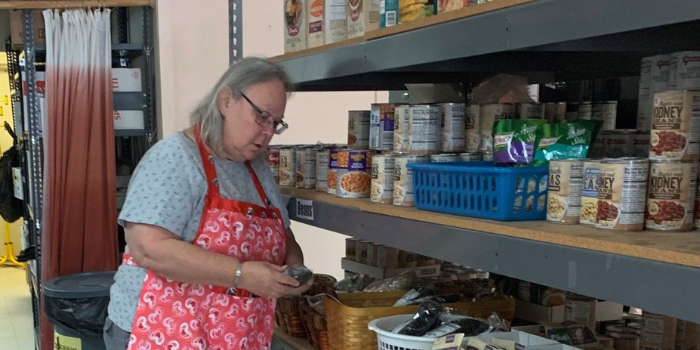
“I see people who never make quite enough to stop needing help,” Hagan said, “and I see people who never thought they’d need it.”
Help for the hungry also comes on a smaller scale. Many Jewish organizations, including Hadassah chapters across the country, hold periodic food drives. K’helah Shel Nashim, a chapter in the Hadassah Southern California region, launched a Feed Our Friends initiative last year. In two separate drives, dozens of volunteers collected cans and other nonperishables to distribute to local food banks.
“The outpouring of donations and support was truly heartwarming, and it felt great to support the mission of Hadassah by helping those less fortunate who are living right here in our own community,” said Cindi Feig, president of the chapter.
While charities and nonprofits fill an essential role when it comes to alleviating food insecurity, it can only end if the government approaches the issue in a fully committed bipartisan fashion, MAZON’s Leibman said. “More people in government have to realize that food insecurity is not the individual’s fault and that we have an obligation to help those who are struggling.”
Cathryn J. Prince is a freelance journalist and author whose most recent book is Queen of the Mountaineers: The Trailblazing Life of Fanny Bullock Workman.










 Facebook
Facebook Instagram
Instagram Twitter
Twitter
Leave a Reply